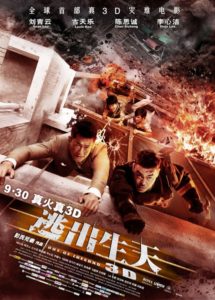Out of Inferno 3D
逃出生天 3D
Hong Kong/China, 2013, colour, 2.35:1, 3-D, 107 mins.
Directors: Peng Shun 彭顺 [Oxide Pang], Peng Fa 彭发 [Danny Pang].
Rating: 7/10.
The Peng Brothers’ best film in years is solid genre entertainment, no more.
Guangzhou, southern China, the present day. During a training exercise by the city’s fire-fighting force, Mai Qiang (Gu Tianle) is bawled out by his supervisor, elder brother Mai Dajun (Liu Qingyun), for not following regulations. Subsequently, Mai Qiang leaves the force to work as a consultant for his uncle, while Mai Dajun stays on. Four years later, on the hottest day for 50 years (34°C, 99% humidity), Mai Dajun drops his three-month pregnant wife Lin Sile (Li Xinjie) off at the Guangzhou International Trade Centre for a check-up by her obstetrician Li Jianle (Chen Sicheng) on the 14th floor. In the foyer she bumps into Mai Qiang, who hasn’t contacted his brother in four  years. Mai Qiang, who designed the building’s fire-security system, is on his way to a fund-raising reception on the 40th floor being thrown by his company, set up with his partner Bingbing (Tang Shiyong), to whom he now proposes. Meanwhile, back at work, following pressure from his wife, Mai Dajun applies for a transfer. Suddenly a fire breaks out in the air-conditioning plant in the GITC’s basement and Mai Dajun finds himself called out to deal with the problem. Inside the building, Mai Qiang evacuates the guests at his reception. But elsewhere, Lin Sile is trapped with her obstetrician; a family whose wife (Jin Qiaoqiao) is opening a shop lose their young daughter (Lin Xinqiao); and two workers (Ma Yuke, Tian Zhenwei) in a diamond-cutting business steal the goods when their boss (Xu Shaoxiong) is accidentally killed.
years. Mai Qiang, who designed the building’s fire-security system, is on his way to a fund-raising reception on the 40th floor being thrown by his company, set up with his partner Bingbing (Tang Shiyong), to whom he now proposes. Meanwhile, back at work, following pressure from his wife, Mai Dajun applies for a transfer. Suddenly a fire breaks out in the air-conditioning plant in the GITC’s basement and Mai Dajun finds himself called out to deal with the problem. Inside the building, Mai Qiang evacuates the guests at his reception. But elsewhere, Lin Sile is trapped with her obstetrician; a family whose wife (Jin Qiaoqiao) is opening a shop lose their young daughter (Lin Xinqiao); and two workers (Ma Yuke, Tian Zhenwei) in a diamond-cutting business steal the goods when their boss (Xu Shaoxiong) is accidentally killed.
REVIEW
Without over-rating it as a slice of pure popcorn entertainment, Out of Inferno 3D 逃出生天3D – “the world’s first disaster movie in real 3D” according to Mainland posters, “Hong Kong’s first 3D disaster movie” according to Hong Kong posters – is the best film by the very wobbly Peng Brothers 彭氏兄弟 since The Eye 见鬼 (2002) – yes, that’s more than a decade ago. A solid genre exercise with flashes of real quality, it leaves their last stereoscopic collaboration, lame horror The Child’s Eye 3D 童眼 (2010), limping in the dust. Inbetween the two, Peng Shun [Oxide Pang] – the way more talented of the twins – also directed the very respectable Sleepwalker in 3D 梦游 (2011) on his own, and it’s tempting to ascribe Inferno‘s qualities to him. More likely, the improvement is equally due to the fact that Inferno is an action movie: though the Pengs’ names are largely associated with horror/ghost films, their better productions have actually been either pure action (Bangkok Dangerous บางกอกแดนเจอรัส เพชฒฆาตเงียบ:อันตราย, 1999; The Storm Warriors 风云II, 2009) or psychodramas (The Eye; Peng Shun’s The Detective C+ 侦探, 2007) rather than ghouly frightfests.
With a comfortable budget (HK$150 million) and exteriors shot in Guangzhou, China (where the story is set), the movie has a proper sense of size for a fire-fighting spectacle. It lacks the glossy production values of The Tower 타워 (2012), South Korea’s recent excursion into the genre, but it does have an authentically local feel rather than simply trying to replicate and outdo similar Hollywood movies.
The biggest weakness of the Pengs’ films has always been their scripts and this one, by the late Situ Jinyuan 司徒锦源 [Szeto Kam-yuen] (who died in Oct 2012 and to whom the movie is dedicated), Deng Liqi 邓力奇 (Accident 意外, 2009), Mainlander Wu Mengzhang 吴孟璋 (Sleepwalker) and the Peng twins themselves, is nothing special. The by-the-book screenplay simply assembles a collection of characters in a high-rise building before stranding them on various floors. The outbreak of the fire at the 20-minute mark is borderline unbelievable, as are some other coincidences; but to its credit the tight editing (as usual, by Peng Zhengxi 彭正熙 [Curran Pang]) doesn’t let the film get too bogged down in emotional subplots involving what are only ever cardboard characters. Action predominates, with just a smidgeon of conflict between the two male leads. Indeed, one subplot, which hints at a backstory between the female lead and her obstetrician, appears to have been all but excised.
The action, claustrophobically staged by Hong Kong veteran Lin Di’an 林迪安 [Dion Lam], has a more realistic, everyday feel than the unbelievable heroics in some disaster movies; it’s the better for it, with one vertiginous rescue sequence centred on a crane and another set in a flooded lift shaft. However, the dominant theme in Inferno is fire, which is visually well caught by d.p. Pan Yaoming 潘耀明 [Anthony Pun] (Overheard 窃听风云, 2009; Shaolin 新少林寺, 2011; The Silent War 听风者, 2012) in his first Peng Brothers outing, though not endowed with the visceral, living quality of the grittier Lifeline 十万火急 (1997) by Du Qifeng 杜琪峰 [Johnnie To]. The film’s sense of geography is no clearer than most of today’s disaster movies but individual interiors (shot in Thailand) and basic special effects (collapsing roofs and floors, explosions) are fine, relatively unexaggerated despite good use of 3-D.
Donning a fireman’s suit for the second time in his career (after Lifeline), Liu Qingyun 刘青云 [Lau Ching-wan] is believably grizzled and professional, as the brother for whom the rulebook comes first and family ties second. However, a miscast Gu Tianle 古天乐 [Louis Koo] is scarcely believable as either his younger brother or a former fireman for whom the rulebook comes second to family ties, and he’s consistently out-acted on a physical level by Liu and on an emotional one by Li Xinjie 李心洁 [Angelica Lee] as his sister-in-law. It’s Li, in her fourth appearance in husband Peng Shun’s movies (The Eye; Re-cycle 鬼域, 2006; Sleepwalker), who gives the most thoughtful performance, breathing genuine emotion into a generic role. Partly thanks to her, though also to the score by Jin Peida 金培达 [Peter Kam] and Wang Jianwei 王建威, the film’s nicely downbeat coda – virtually dialogue-free – packs some real emotion, another surprise in a Peng Brothers film.
The original title roughly means “Escaping Alive”. Though largely financed by Mainland money and set in China, the film defiantly bucks the current linguistic trend for such co-productions by being shot in Cantonese rather than Mandarin, and the end credits give only Cantonese versions of characters’ names. The decision can be partly justified by the fact that Cantonese is widely used in Guangzhou, which is just across the border from Hong Kong, but it’s weakened by the key Hong Kong actors using their own voices and speaking with Hong Kong accents. In China the film was shown in a Mandarin-dubbed version, except in Guangzhou and the rest of Guangdong province where most prints were Cantonese.
CREDITS
Presented by Bona Film Group (CN), Guangzhou Ying Ming Culture Communication (CN), Universe Entertainment (HK), Sun Entertainment Culture (HK), Golala Investment (CN). Produced by Enable Film Production (HK).
Script: Situ Jinyuan [Szeto Kam-yuen], Deng Liqi, Peng Shun [Oxide Pang], Peng Fa [Danny Pang], Wu Mengzhang. Photography: Pan Yaoming [Anthony Pun]. Editing: Peng Zhengxi [Curran Pang]. Music: Jin Peida [Peter Kam], Wang Jianwei. Art direction: Li Jianwei. Costume design: Ida Triệu. Sound: Zheng Yingyuan [Phyllis Cheng], Wang Qingsheng. Action: Lin Di’an [Dion Lam]. Special effects: Jin Tangfu. Visual effects: Huang Hongda, Zhang Zhonghua (VFX Nova Digital Productions). 3-D stereography: Markus Lanxinger.
Cast: Liu Qingyun [Lau Ching-wan] (Mai Dajun), Gu Tianle [Louis Koo] (Mai Qiang, Mai Dajun’s younger brother), Chen Sicheng (Li Jianle, obstetrician), Li Xinjie [Angelica Lee] (Lin Sile, Dajun’s wife), Li Xinqiao (Linlin, trapped girl), Ma Yuke (Hao, Sun’s larcenous employee), Jin Qiaoqiao (Meimei, Linlin’s mother), Zang Jinsheng (Gao Sheng, chief security guard), Zhang Zhaohui [Eddie Cheung] (Xin, Meimei’s husband), Ma Dezhong (Liu Ting), Xu Shaoxiong (Sun, diamond merchant), Xiaofei (Gao Baoqiang, Gao Sheng’s son), Tang Shiyong (Bingbing, Mai Qiang’s fiancee), Xu Jiaqi (Mandy, Mai Qiang’s assistant), Zhang Chi (Xie, fireman), Tian Zhenwei (Dong, Sun’s other employee), Li Yejian (Zhong, fireman), Gao Sizhe (Qiu, fireman), Kittipong Subthawonpan (Zhang, fireman), Punyaphat Boonkoonchanakom (Jie, fireman), Tan Gancong, Zhang Yaohui (victims), Ou Xuanwei (Zeng, CEO), Feng Kangning (Wang, CEO), Li Zhiwei (Huo, supervisor), Huang Suhuan (victim’s mother), Wang Jun (reporter), Zhao Gongrong (chemical company boss), Li Zhizhong (construction site foreman), Zhong Lei (firemen’s deputy chief commander), Zhao Fanghua (firemen’s deputy commander), Heng Renjun (brothers’ father), Liu Yong (Chen, CEO).
Release: China, 30 Sep 2013; Hong Kong, 3 Oct 2013.
(Review originally published on Film Business Asia, 20 Oct 2013.)
